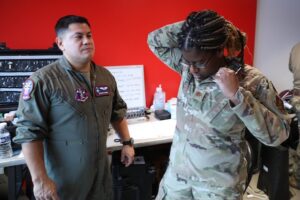
Story by Spc. Carrol Walter Hughes IV
60th Presidential Inauguration Joint Information Center
WASHINGTON, D.C. — Ensuring the health and readiness of thousands of service members supporting the 60th Presidential Inauguration is no small task. U.S. Air Force Maj. Amanda Olagunju, a family medicine physician with the 113th Medical Group, Air National Guard, is bringing eleven years of military experience in support of Joint Task Force–District of Columbia’s medical staff.
One of the most pressing challenges is the prevention of illness in close living quarters during cold and flu season.
“Our unit’s focus is to keep our servicemen and women healthy and mentally and physically ready for duty,” Olagunju explained. “Particularly, we’re working hard to be preventative when it comes to the spread of viruses.”
Beyond providing care, Olagunju emphasized the importance of cross-component communication.
“We work closely with public health to prevent the spread of contagious disease, but really, we couldn’t do our job without logistics to provide us with supplies,” she said. “The correspondence between Air Force and Army has been top notch. We sent it up the chain that we needed masks during an influx of patients with upper respiratory symptoms and a Soldier delivered them to us the same day.”
For her, the most rewarding aspect of the mission is helping fellow military members recover when they’re ill.
Tech Sgt. Christopher Jenkins, a flight medicine technician with the 113th Medical Group, Air National Guard, is another vital member of the medical team, with over three years of service in the National Guard and twelve years as an active-duty medic.
“I didn’t want my experience and training to go to waste, so I joined the Guard to continue serving while attending school full-time,” Jenkins shared. He specializes in health care and standards for pilots, specialist ops, and any other special identified jobs that require monitoring.
A typical day for Jenkins involves treating flu-like symptoms and musculoskeletal injuries, with the weather adding a layer of complexity.
“You see more patients slip and fall when it’s cold. There’s an increase in injuries you wouldn’t typically expect,” Jenkins said. “We conduct pre-training and go over worst-case scenarios to ensure we’re prepared for everything.”
As preparation for the 60th Presidential Inauguration continues, these teams play a crucial role in maintaining the health and operational readiness of service members.